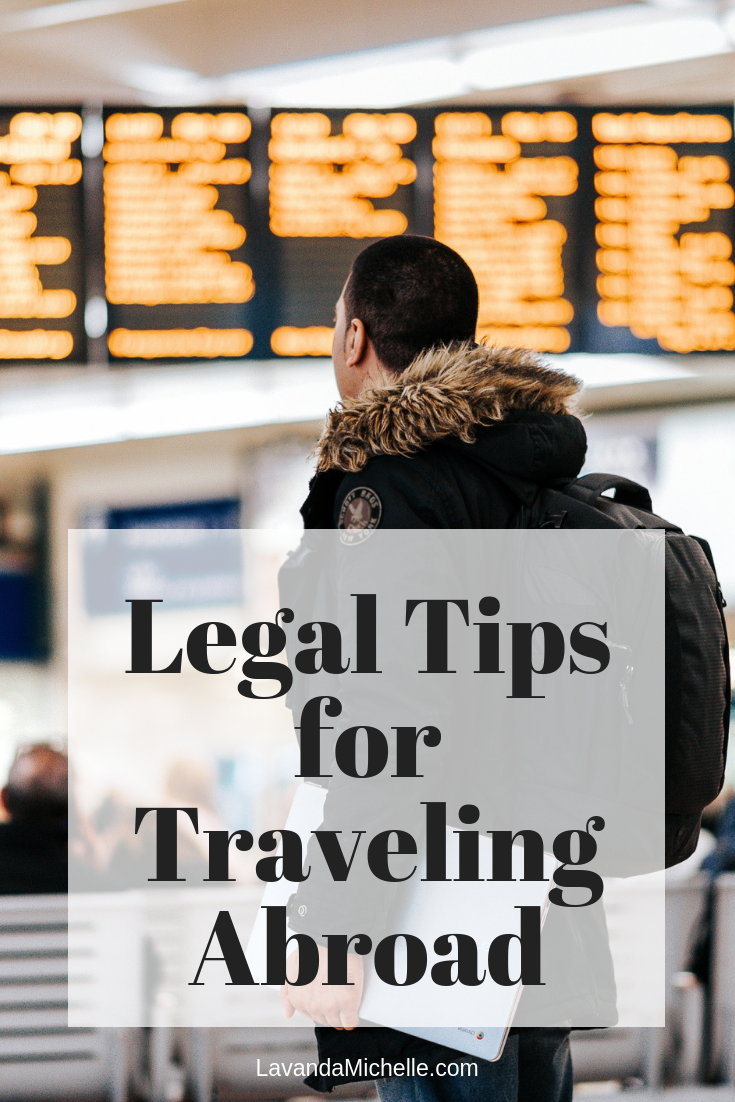
You have already booked your flight and have even created an itinerary for your trip abroad, but have you paused to consider the legal hurdles you might face in a foreign land? Different countries have different laws and customs, and while not being familiar with another country’s laws may seem innocent, ignorance is no defense where the law is concerned.
Since 9/11, travel abroad has become more complicated. Here are a few legal tips you should follow to avoid being on the wrong side of the law in a foreign country.

First, it is essential to keep your original travel documents safe. Make two copies of each travel document. Leave one copy at home with a relative or trustworthy friend. Keep the other separate from the original. You should apply for a new passport a few months in advance, or ensure your current one has two or more blank pages and is valid for at least six months. Some airlines are very strict with the six-month validity rule.
You may be required to apply for a visa before traveling abroad. The requirements will vary; make sure to check with relevant embassies for detailed information. If you wish to carry prescription or over the counter medication, ensure you carry any documentation and check with the relevant embassies about regulations.
If you’re traveling with kids, you may be required to carry custody documents or written consent from their parents. If you intend to drive, you may need an international driving license; most foreign nations do not recognize a U.S. license.

Make sure to do proper research before committing to travel to a foreign country. Some countries are just too dangerous. Check with the U.S. Department of State prohibitions for countries where the U.S. government’s efforts to assist American citizens may be hampered by unavoidable circumstances like the closure of an embassy.
Ensure you possess all the relevant documentation required before entering the country, and avoid carrying items that may be prohibited. Most importantly, you should familiarize yourself with the local customs and cultural expectations. For example, some countries have specific dress codes and restrictions on alcohol usage. That is especially true in Muslim-majority countries.
Laws and customs differ from one country to another. What may be considered legal in your country may attract harsh penalties in another. It is, therefore, imperative to familiarize yourself with the local laws before you travel.
While some laws are pretty obvious, others may be surprising. For instance, Canada has a limit on the number of pennies you can use at a time (25). You can get arrested for failing to flush a toilet in Singapore. Wearing a mask in public can land you in jail in Denmark, and so on.

Anything can happen when you’re in a foreign country. For your safety, it is important to have at least one person who is familiar with your travel itinerary back at home. Today, it is easy to maintain regular contact with friends and family abroad through social media. You should also have addresses and phone numbers of the local embassies in case of emergencies.
You should also be aware of customs regulations, and know how to return home. Check with the U.S. Customs and Border Protection for a list of prohibited and restricted items. Prohibited refers to items that are illegal in the U.S. while restricted means they require permits to be allowed into the country. Restricted items may include firearms, animal products, and certain fruits and vegetables.

If you are a Lawful Permanent Resident (LPR) of the United States, you will need to present a Permanent Residents Card to reenter the country. You may also need a Reentry Permit if you’ve been away for more than a year or a Returning Resident Visa if you have been gone for two or more.
Unfortunately, even when following the law, there is still a possibility of getting arrested in a foreign country. Regardless of why you got arrested, you should ask to contact the nearest consulate or American embassy. Most jurisdictions will allow you to talk to a consular representative. Your legal rights in such instances will vary depending on the local laws and regulations, as well as the circumstances of your arrest. You should always have phone numbers of the U.S Embassy handy while traveling abroad in case of such mishaps.

While international travel can be fun, there is always a danger when traveling to foreign jurisdictions. Always ensure you are familiar with the basic legal tips outlined above to prevent you from getting on the wrong side of the law and to assist you in case you find yourself in the hands of foreign authorities.
What are your thoughts? Please share in the comments below. I really would love to know.
Until next time, shine amongst the stars!
‘This post may contain affiliate links’
Guest Post By Jameel Manji, founder of Manji Law, P.C.
Taking Your Blog From $0 to $1,000/Month with Free Traffic, Affiliate Marketing, and Other Awesome Strategies




I love to travel and I started traveling aboard recently. I wish I would’ve had some of these tips beforehand but I’m glad to have them now for my trips next year
❤ Thanks for reading & sharing your thoughts!
Good advice!! Although it’s quite scary that we have to have articles like this for the US – what has the world come to?
Totally Gavin ❤ Thanks for reading & sharing your thoughts!